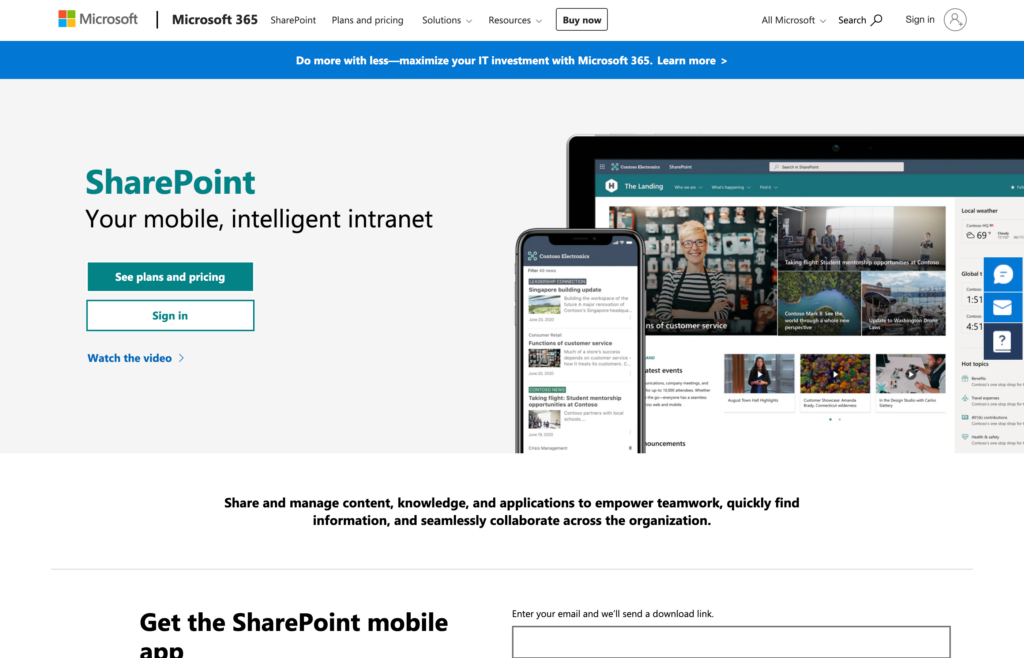Efficient document management, sharing, and collaboration have become crucial for businesses of all sizes. In this article, we’ll look at the top document management software for small business and examine the pros, cons, key features, and pricing.
Document management systems are platforms for storing, organizing, and managing documents. The best systems are in the cloud, allowing access from any authorized user regardless of where they are working.
However, document management software for small business is different than cloud storage. A document management system provides management tools, resources for sharing documents, and automation for workflow in addition to storing documents. The best document management systems for small business help you keep all of your organization’s types of documents in a user-friendly platform with robust document security.
In this article, we’ll look at the top document management systems (DMS) for small business and examine the pros, cons, key features, and pricing or free trial options.
Our Top Picks
-
Best all-in-one cloud-based document management system
-

Good for creating and editing files
-

Good for streamlining file storage and sharing
Why trust us?
Our team of unbiased software reviewers follows strict editorial guidelines, and our methodology is clear and open to everyone.
See our complete methodology
21
Tools considered
13
Tools reviewed
6
Best tools chosen
How to Choose a Document Management System for Small Business
A document management system for small business should host all your documents in one place. It should allow for easy access and secure file storage. As a small business, you also want your document management system to be easy to use — without needing to depend on a tech team just to access your files.
The 6 Best Document Management Systems for Small Business of 2025
-
Connecteam — Best all-in-one cloud-based document management system
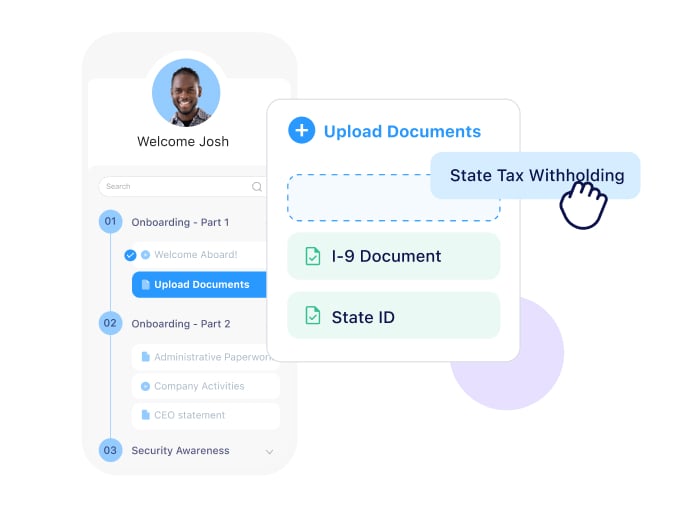
Connecteam is the easiest platform to use for collecting, managing, and organizing your documents in a central repository. Rated as the top all-in-one solution for small and medium-sized businesses, Connecteam is great for HR and onboarding and processing. It allows employees to upload required documents and manage personal files safely in one location. This minimizes onboarding time and gets employees working faster — freeing up time for other important tasks.
Expiration and alerts
You can set expirations for documentation with automated alerting to ensure your employee records are always up to date. For example, you can set notifications to inform you when employee compliance documents, licensing, or certifications are about to expire so you can update your records.
Eliminate data silos
Because you can access all your documents in one app, you can eliminate data silos and document management channels. There’s no more need to use email, Google Drive, or Dropbox to keep track of things and worry about where something is stored.
Robust access management
You can instantly retrieve any document you store, grant permissions to users, and restrict data only to authorized users. This makes sharing documents with team members easy while ensuring only authorized users have access.
Knowledge centers
You can also use Connecteam to build comprehensive knowledge centers for internal teams, adding as many files as you want. For example, you can store all of your onboarding information, training documents, company handbooks, policies, and FAQs in an area set up for new employees. This also makes it easy to make global changes, ensuring everyone has access to the latest information.
Easily share documents in chats, groups, or directly
Teams can share documents in team chats, directly with other team members, or assign documents to groups. Connecteam works especially well for “deskless workers” who do not have regular access to an office computer or corporate email.
Key Features
Robust document management teams
Pros
Easy to use with intuitive tools
Uses minimal storage space
Affordable alternative to other DMS solutions
Excellent customer support
Cons
Does not support document collaboration at this time
Pricing
Free-for-life plan availablePremium plans start at $29/month for 30 users
14-day free trial, no credit card required
Start your free trial -

Zoho WorkDrive (formerly Zoho Docs) — Good for creating and editing files
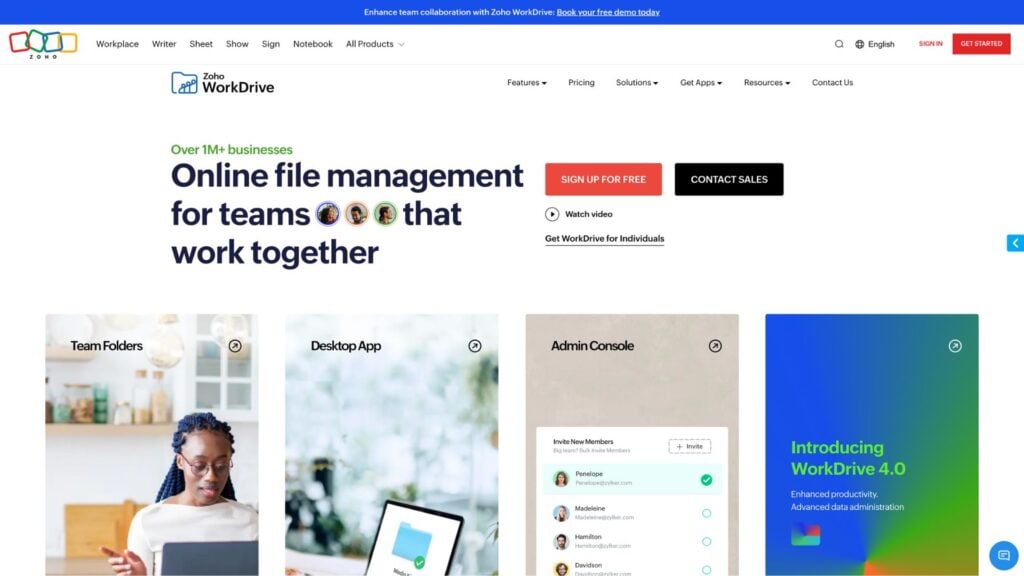
Zoho WorkDrive is another alternative document management software that goes beyond creating and storing documents in a central repository. It provides a secure, shared workspace that is simple and easy to use. It also brings together email, chat, calls, and task management into the same space.
Zoho discontinued its stand-alone document management project, Zoho Docs, in early 2025 but rolled the features into Zoho WorkDrive. It includes all the built-in collaboration tools from Zoho Docs, enabling users to connect, communicate, review, comment on, or edit files in real time. The software also facilitates assigning tasks to specific team members or groups.
Key Features
- Document classification
- Electronic Signatures
- Version Control
- Audit Trail
Pros
- Secure, shared workspace for team collaboration and communication
- Fast response and simple to use
Cons
- Can be challenging to find files if you don't know where they are stored
- Two-factor authentication (2FA) is missing in entry and midlevel options.
Pricing
Starts at $2.50/user/month Trial: Yes — 15 days Free Plan: Yes — For individual use
-

Box — Good for streamlining file storage and sharing
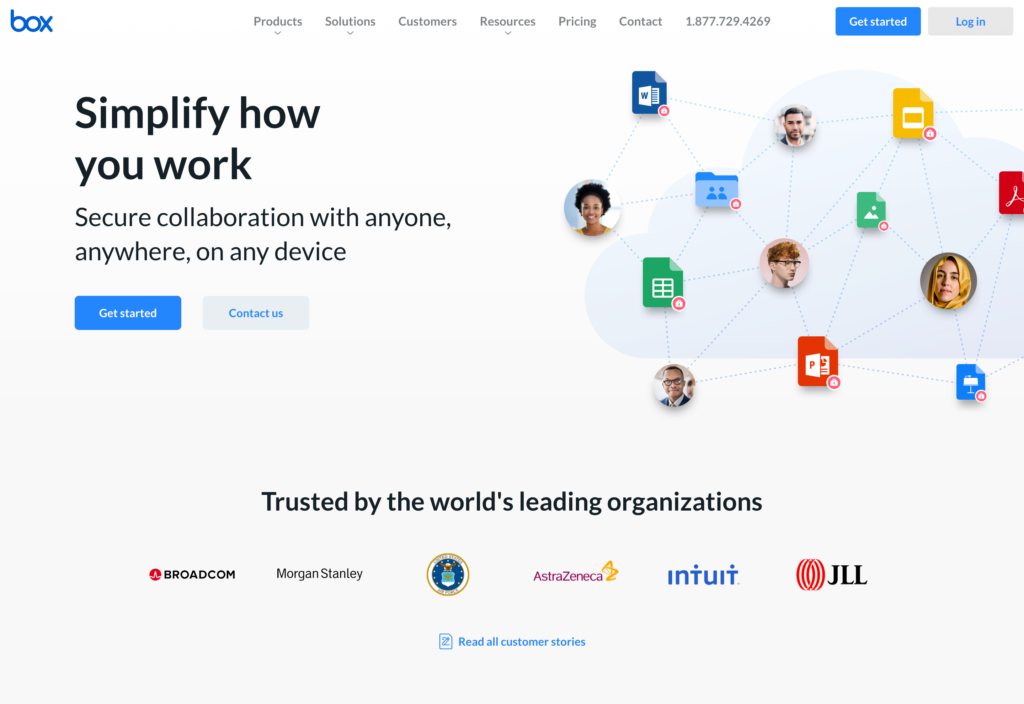
Box for Business allows you to upload and share documents across your organization easily. You can host private files and send direct links or download content before sending. Box for Business also allows you to customize links to give viewing or editing permissions and generate password-protected links. Links can include a custom URL and be set to expire automatically after a specific interval and allow or block downloading of documents.
Users can get up and running quickly with an intuitive interface for file storage. However, some users find permissions and admin setup to be a little challenging.
You can also edit offline; synced documents will automatically update once online. However, there is a bit of a lag time. External users like clients and customers are only given read-only privileges and cannot edit documents, which might complicate collaboration.
Key Features
- Drag and drop functionality
- Customizable templates
- Workflow management
- Archiving and retention
Pros
- Unlimited data storage
- Task automation, such as reminders and approvals
Cons
- Does not support optical character recognition
- Can be difficult to find documents unless you know the location
Pricing
Starts at $20/user/month Trial: Yes — 14-day Free Plan: No
-

SmartVault — Good for document storage and sharing
Available on
- Web
- iOS
- Android
- Windows
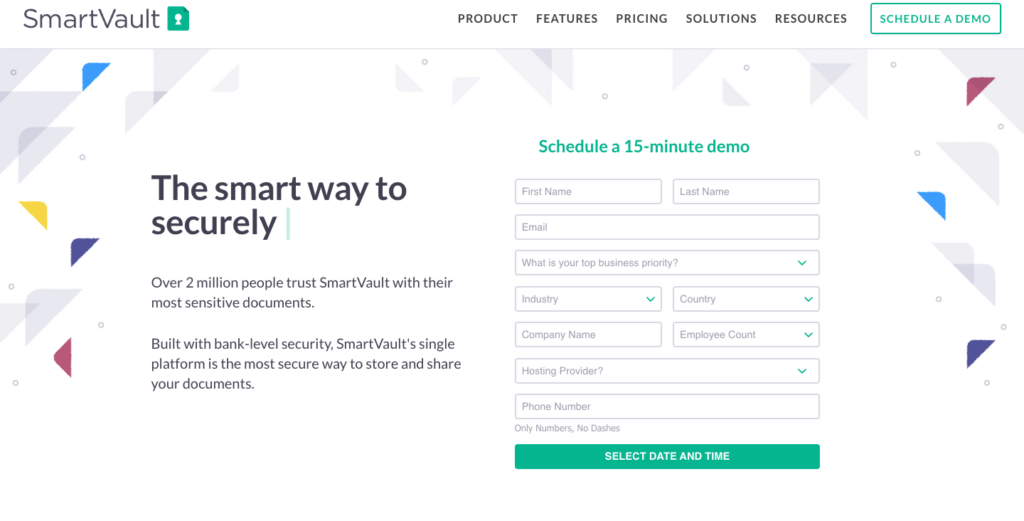
SmartVault is designed for secure, cloud-based document management and storage, emphasizing compliance and workflow. It’s good for sharing documents with clients, including creating branded client portals. While you cannot edit documents in SmartVault, you can streamline processes using standardized templates.
SmartVault touts its “bank-level security” to protect documents at a higher level than consumer-grade cloud apps. While it allows for client interactions, clients must have an account to access any documents on the platform.
Key Features
- Encrypted document management
- Collaboration tools
- Drag and drop functionality
- Workflow management tools
Pros
- Strong access controls and permissions
- Automated audit trails
Cons
- Cannot edit documents in SmartVault
- Does not support real-time document sync
Pricing
Starts at $20/month per user with a minimum of 5 users Trial: Yes — 14 days Free Plan: No
-

Google Drive — Good for file storage and collaboration
Available on
- Web
- iOS
- Android
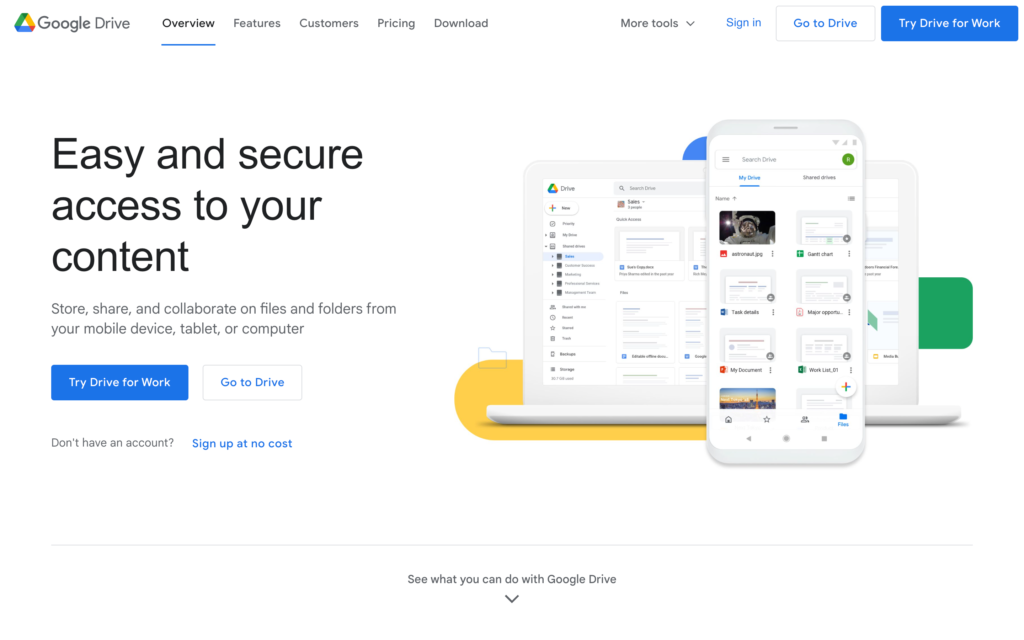
Google Drive provides encrypted access to files and works seamlessly with Google Suite, including Google Docs, Google Sheets, and Google Slides. It allows you to collaborate in real time with team members. It works well for basic file storage and as a central archive, but does not provide the robust file management and document management systems that some businesses need. For example, it does not offer support for compliance, advanced versional controls, or automated workflows. However, it’s a solid choice for basic document management and having a centralized, collaborative place for files.
Google Drive also works with Microsoft Office files, so you can upload and edit Word, Excel, or PowerPoint documents online without converting them.
Key Features
- Drag and drop interface
- Search and filter capabilities
- Collaboration and tracking tools
- Version control
Pros
- Ease of use
- Also provides offline document access
Cons
- Does not support electronic signatures
- Does not support workflow management
Pricing
Free for the first 15GB Trial: No Free Plan: Yes
The 6 Best Document Management Systems for Small Business of 2025
| Topic |
 Start for free
Start for free
|

|

|

|

|

|
|---|---|---|---|---|---|---|
| Reviews |
4.8
|
4.6
|
4.4
|
4.3
|
4.4
|
4.8
|
| Pricing |
Starts at just $29/month for the first 30 users
|
Starts at $2.50/user/month
|
Starts at $20/user/month
|
Starts at $4.59/user/month
|
Starts at $20/month per user with a minimum of 5 users
|
Free for the first 15GB
|
| Free Trial |
yes
14-day
|
yes
15 days
|
yes
14-day
|
no
|
yes
14 days
|
no
|
| Free Plan |
yes
Free Up to 10 users
|
yes
For individual use
|
no
|
no
|
no
|
yes
|
| Use cases |
Best all-in-one cloud-based document management system
|
Good for creating and editing files
|
Good for streamlining file storage and sharing
|
Good for Microsoft 365 users for shared work environments
|
Good for document storage and sharing
|
Good for file storage and collaboration
|
| Available on |
Web, iOS, Android
|
Web, iOS, Android, Windows
|
Web, iOS, Android
|
What Is a Document Management System for Small Business?
A document management system (DMS) is an online platform to store, manage, and share documents. A DMS allows you to centralize your document management and convert physical files to digital files. This reduces time-consuming manual document filing and retrieval, enabling sharing with authorized users.
Depending on the DMS you choose, you may be able to edit and leverage modern tools, such as electronic signatures and online collaboration.
How Does Document Management Software for Small Business Work?
Document management software lets you capture and store documents digitally in a central database. The best document management solutions are cloud-based to provide access to any connected and authorized user.
Users can access and collaborate on documents, share documents with other authorized users, and automate workflows. They also have access to tools for document routing, approvals, and alerts to increase efficiency.
Most DMS solutions can archive older versions of documents and help track changes to provide an audit trail.
The Benefits of Document Management Software
Document management software help small businesses streamline workflow and operations. Benefits include:
- Reduced storage space: You eliminate the need for physical filing cabinets, boxes, and bind to store documents. Not only does this make it easier to find the documents you need, but it reduces floor space.
- Organization: It’s much easier to find, store, and search for documents in document management software.
- Document backup and recovery: In case of a fire or flood, physical documents can be lost or destroyed. A DMS provides automated backup for business continuity and disaster recovery.
- Improved workflow: One recent study showed that nearly half of all businesses struggle to find and share documents, and about a third had concerns about versioning. The best document management software for small businesses can solve these problems.
- Compliance: Complying with evolving industry and governmental regulations can be challenging. The right DMS will assure compliance.
- Security: A secure, encrypted DMS will keep your documents safe.
- Sharing and collaboration: DMS tools make sharing and collaboration simple, supporting remote workers, distributed workforces, and clients.
- Greater access: Physical documents are only stored in one place, and access may be limited. Digital storage allows sharing with anyone authorized for access without having to wait.
Managing and maintaining paper files is no longer practical. Hunting for files and folders in filing cabinets and boxes can take up a lot of time that could be used more productively. Even if all of your files are online, it can still be difficult to keep them organized and accessible if they’re not properly managed.
An efficient DMS lets you search using words or phrases without knowing the exact file type, name, or location. One survey reported that more than half of office workers spend more time searching for files than working on them. The same study showed how challenging this can be when information is needed promptly — 81% of office professionals surveyed said they couldn’t locate an important document when their boss or client needed something urgently.
This has become even more difficult for remote and hybrid workers who need access to information regardless of where they work.
How Much Do Document Management Systems for Small Business Cost?
Small business document management systems are free for a limited number of users to several hundred dollars a month, depending on the level of access and plan you choose.
For example, Connecteam’s small business package is 100% free for the first 10 users. Even if you have a slightly larger team — up to 30 people — Connecteam’s Basic plan is just $30 a month.
By comparison, 10 users with SmartVault would cost $400 per month. The cheapest Microsoft SharePoint plan would be $50 per month for 10 users or $230 per month as part of a Microsoft 365 E3 license.
FAQs
Several types of document management systems exist, including content and record management, workflow management, HR document management, and document imaging. When evaluating a DMS, you want to ensure it includes the tools you need for your business.
Using a cloud-based document management system makes storing, organizing, and sharing documents simple. It provides a central location for all your documentation, making searching and collaboration easier.
The best document management software for your small business will let you customize the solutions to align with how you do business. Ensure your DMS is easy to use, offers robust security and compliance, supports workflow automation, and integrates with your existing tech stack.
Yes, cloud-based document management systems are secure. Look for a solution that provides automatic encryption of documents and allows for access management and privacy tools. Cloud management systems are actually more secure than on-premises services because platform providers monitor security and ensure software patches and updates are applied.
The Bottom Line on Document Management Systems for Small Business
A robust and secure document management system for small business can streamline workflow, make document storage and retrieval simpler, and allow for sharing with team members and clients. Look for a DMS that provides the tools you need and is easy to use to enhance your organization’s productivity.
Connecteam is the top choice for small and medium-sized businesses looking to improve their document management. Take a small step for yourself — and a giant leap for your business — with Connecteam today. Don’t forget to check out Connecteam’s Small Business Plan for everything you need to manage your business.

